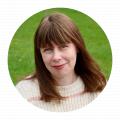
Lucid dreaming is said to be a powerful tool for wellbeing, which can help improve everything from your health to relationships – but what is it and how does it work? We find out more from Norwich-based therapist Leah Larwood.

Have you ever been asleep and realised that you're dreaming? Perhaps you have even been able to influence what happens in your dream. If so, then you've experienced what's called 'lucid dreaming'.
Getting a good night's sleep is one of the pillars of wellbeing and lucid dreaming is fast becoming a mainstream tool for wellbeing. And this spring Norwich-based hypnotherapist Leah Larwood, of The Moon Lab, is holding a series of workshops in the city, focused on how to use dreams and creative writing therapeutically.
As Leah explains: "A lucid dream is effectively when you are aware that you are dreaming and are able to exert from influence over your dreams. Once awake inside a dream you have access to a really refined state of consciousness. It's effectively like a powerful form of self-hypnosis and you can carry out a number of really beneficial things while lucid to improve your health, wellbeing, relationships - or simply have fun."
Leah has been having lucid dreams since she was a child, although at the time she didn't know that was what they were.
"My dad was always the one that was very interested in dreams and during my childhood he did always ask me about my dreams. Most people have lucid dreams, especially as children, but lucid dreaming can be learned at any age."
Leah has spent the last 10 years practicing mindfulness of dreams and sleep and lucid dreaming under the guidance of teacher and best-selling author Charlie Morley and is now passing on what she has learned through her workshops.
The first will be aimed at the parents of babies or wakeful young children, and will focus on how to have a lucid dream and use it to support wellbeing, relationships, career and as a tool to help cope with sleep deprivation.
And the second is a general introduction to lucid dreaming and the benefits of harnessing the different sleep states to support wellbeing and health, creativity and more.
"I will take people through the tools you need to have a lucid dream - practical exercises, a simple meditiation to use as you fall off to sleep and mindfulness techniques.
"When you are in the epicentre of your dream the idea is not to control it but work with it and ask questions of your subconscious. For example, if you ask 'what should I do about my career, what should I do next?' some really interesting ideas can come back," says Leah, who is also a writer and poet and says that she has used lucid dreaming to help with creative writing projects.
"I have had so many lucid dreams and have worken up feeling refreshed. You are freeing up negative energy and doing something really beneficial. Try asking your dreams things - I think it's a really powerful tool."
Leah's Lucid Dreaming for Parents workshop is at Kinda Cafe, Castle Meadow, Norwich on March 7 and her How to Lucid Dream Workshop is at The Wellbeing Centre, Chapelfield East, Norwich on April 5. Both sessions run from 10.30am-4pm. She will also be running therapeutic writing and dream writing workshops in the spring. To find out more visit themoonlab.net



Comments: Our rules
We want our comments to be a lively and valuable part of our community - a place where readers can debate and engage with the most important local issues. The ability to comment on our stories is a privilege, not a right, however, and that privilege may be withdrawn if it is abused or misused.
Please report any comments that break our rules.
Read the rules here